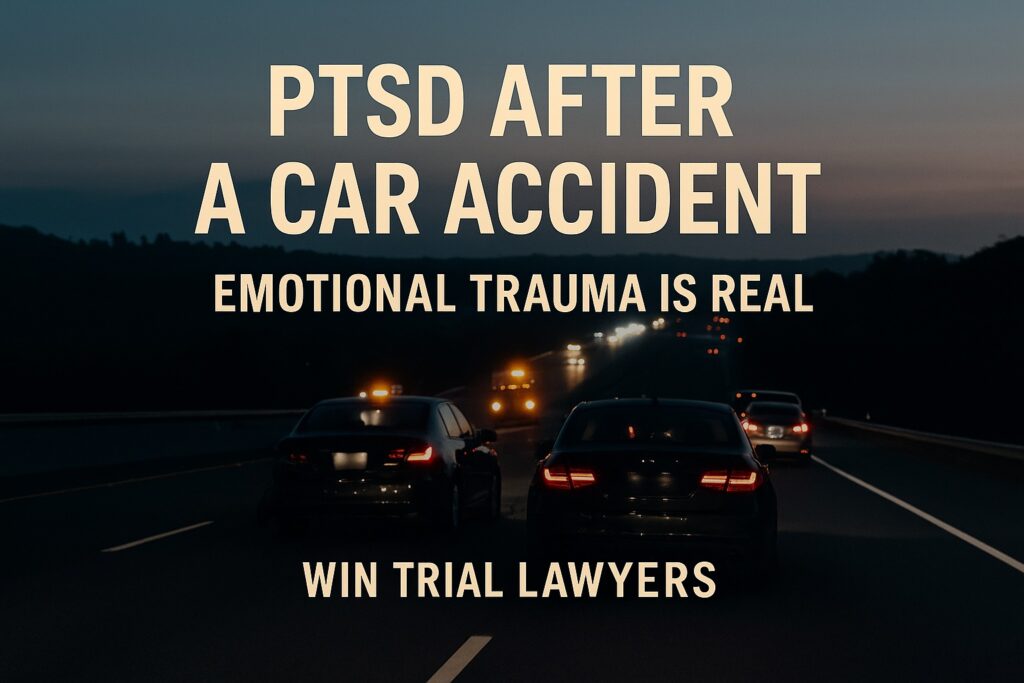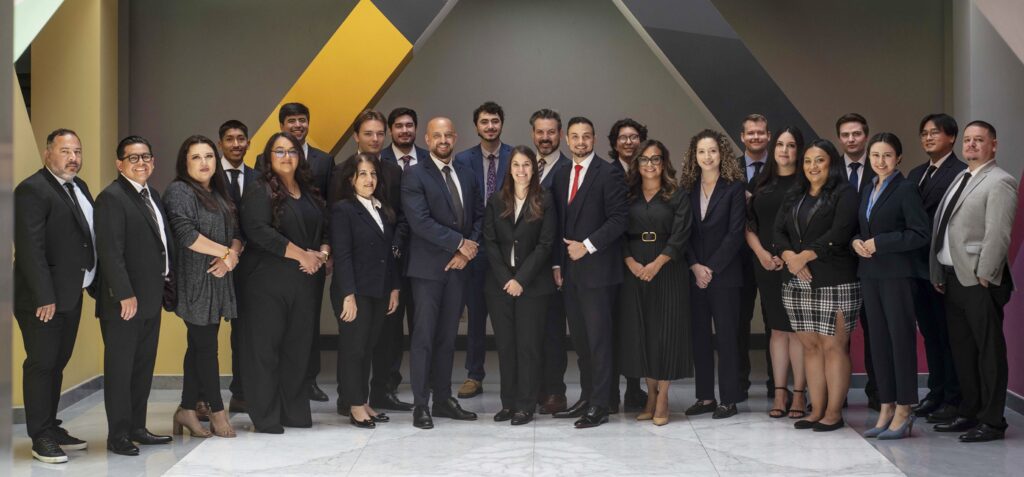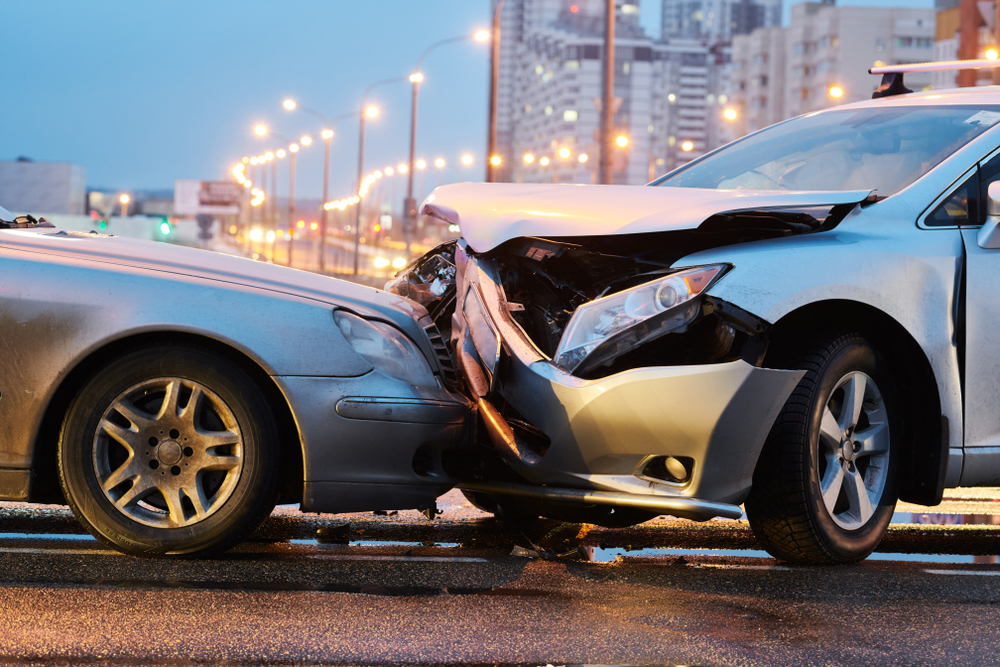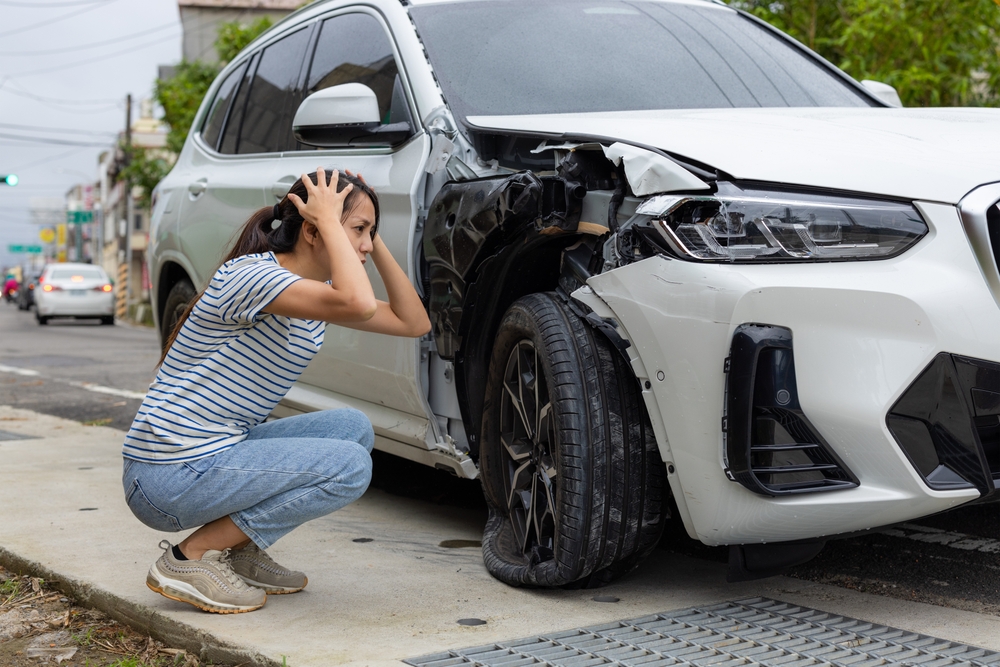
Understanding Emotional Trauma Claims in California
Not all car accident injuries are visible. For many survivors, the most lasting wounds are psychological — not physical. The screech of tires, the impact of metal, or even the sight of a similar intersection can trigger fear, flashbacks, panic attacks, and sleepless nights that persist long after the body has healed.
These symptoms often point to Post-Traumatic Stress Disorder (PTSD) — a serious and medically recognized condition that can affect anyone who has lived through a traumatic crash. Victims may find themselves unable to drive, struggling with anxiety in everyday situations, or reliving the event through nightmares and intrusive memories.
In California, these invisible injuries are just as real — and just as compensable — as broken bones or head trauma. Emotional distress and PTSD claims are protected under California personal injury law, allowing victims to pursue recovery for psychological harm, pain and suffering, and loss of enjoyment of life.
At WIN Trial Lawyers, we understand that healing isn’t only physical. We help accident victims recover compensation for the emotional trauma that lingers long after the crash, ensuring their pain is acknowledged, their story is heard, and their future is protected.
What Is PTSD After a Car Accident?
Post-Traumatic Stress Disorder (PTSD) is a mental health condition that can develop after a person experiences or witnesses a traumatic event — such as a violent or life-threatening car crash. The brain’s normal response to danger becomes disrupted, leaving the victim in a heightened state of stress and fear long after the physical threat is gone.
PTSD can affect anyone involved in a collision — not just those who were seriously injured. Drivers, passengers, pedestrians, and even bystanders who witness the crash can develop the condition. For many people, the event plays on repeat in their minds, triggering a cascade of emotional and physical reactions that make everyday activities feel unsafe.
Common Symptoms of PTSD After a Car Accident
Victims of car accident–related PTSD often experience a combination of emotional, behavioral, and physiological symptoms, including:
- Flashbacks or vivid recollections of the crash that feel real and immediate
- Nightmares or recurring dreams that replay the moment of impact
- Anxiety or panic attacks when driving, riding in a car, or even hearing traffic sounds
- Avoidance behaviors, such as taking longer routes or refusing to drive altogether
- Emotional numbness or detachment from friends, family, or previously enjoyable activities
- Hypervigilance, jumpiness, or feeling constantly “on edge”
- Depression, sadness, or hopelessness linked to loss of confidence or control
- Difficulty concentrating or irritability, which can impact work or relationships
For some, these symptoms surface immediately after the crash. For others, they may not appear until weeks or months later, as the adrenaline fades and the emotional toll becomes clearer.
Left untreated, PTSD can significantly disrupt a person’s career, personal relationships, and overall quality of life. Many victims require ongoing therapy, medication, or both to manage their symptoms — and these medical costs are compensable under California personal injury law.
Can You File a Claim for PTSD After a Car Accident?
Yes.
In California, you can pursue compensation for emotional and psychological harm if your PTSD resulted from another party’s negligence.
Under California Civil Code § 3333, personal injury victims may recover non-economic damages such as:
- Emotional distress
- Pain and suffering
- Loss of enjoyment of life
- Anxiety, fear, or trauma
To win a PTSD claim, your attorney must show:
- The accident was caused by someone else’s negligence;
- You developed PTSD as a direct result of the crash; and
- You experienced measurable emotional and functional impairment.
How PTSD Fits Into a Personal Injury Claim
PTSD is considered a non-economic damage — meaning it doesn’t have a specific dollar value like medical bills or lost wages.
Instead, it’s assessed based on:
- The severity of the trauma
- The duration of your symptoms
- The impact on your quality of life
- Expert testimony from psychologists or psychiatrists
Insurance companies often try to downplay PTSD claims, arguing the victim is “exaggerating.” That’s why legal representation — and credible medical documentation — are critical.
Evidence That Strengthens a PTSD Claim
To prove emotional trauma, experienced attorneys use both medical and experiential evidence, including:
- Therapist or psychiatrist diagnoses
- Treatment records and progress notes
- Prescriptions for anxiety, depression, or sleep disorders
- Testimony from family or coworkers describing behavioral changes
- Journals or personal accounts documenting panic, avoidance, or nightmares
These records build a foundation to show the true scope of your suffering — both to insurers and juries.
PTSD and Physical Injuries: A Combined Impact
Many car accident victims suffer both physical and psychological trauma.
For example:
- A driver who sustains broken bones and is trapped in the vehicle may later develop severe anxiety about driving.
- A pedestrian hit by a speeding car might relive the moment each time they cross a street.
California law allows combined claims — meaning your PTSD damages can be added to your overall pain and suffering compensation.
👉 Related Reading:
How Compensation Works for PTSD Claims
Your settlement or verdict may include both economic and non-economic damages, such as:
| Type of Damage | Description |
|---|---|
| Medical Expenses | Therapy, psychiatry, medication, and diagnostic care |
| Lost Income | Missed work due to PTSD symptoms or treatment |
| Loss of Earning Capacity | Long-term reduction in ability to work |
| Pain & Suffering | Physical and emotional pain |
| Emotional Distress | Fear, anxiety, depression, or trauma symptoms |
| Loss of Enjoyment of Life | Inability to engage in normal activities or relationships |
In severe cases, compensation can also cover future therapy and counseling — particularly if PTSD symptoms are chronic or disabling.
How WIN Trial Lawyers Build PTSD Cases
At WIN Trial Lawyers, our attorneys collaborate with medical experts, therapists, and forensic psychologists to fully document emotional trauma.
We prepare each case with the same rigor as a physical injury claim — often resulting in significantly higher settlement values.
We will:
- Coordinate psychological evaluations
- Present testimony from trauma specialists
- Quantify emotional damages persuasively
- Counter insurance tactics that minimize PTSD
When necessary, we take cases to trial — because insurance companies pay attention when they know you’re ready to fight.
Filing Deadlines for PTSD Claims
In California, most personal injury claims must be filed within two years of the accident (Code of Civil Procedure § 335.1). However, because PTSD symptoms may develop gradually, the “discovery rule” can extend the deadline — starting from when you reasonably realized your trauma was linked to the accident.
Still, it’s best to consult an attorney as soon as possible, to preserve evidence and ensure timely filing.
Final Thoughts: Mental Health Is Real Health
If you’ve been struggling emotionally after a car crash — avoiding driving, having panic attacks, or feeling constant anxiety — you’re not alone, and you’re not without options.
PTSD is a legitimate, compensable injury under California law.
At WIN Trial Lawyers, we take these cases seriously. We’ll fight for the full measure of your emotional and financial recovery.
Call WIN Trial Lawyers Today

At WIN Trial Lawyers, we know how devastating distracted driving accidents can be. Victims often face mounting medical bills, lost wages, and emotional trauma. Our team has successfully taken on insurance companies and distracted drivers, recovering millions for injured clients.
If you or a loved one has been injured in a speeding-related car accident, don’t leave your future in the hands of the insurance company. You need experienced trial lawyers who know how to prove liability and fight for maximum compensation.
If you or a loved one has been injured in a distracted driving accident, don’t face this alone. The sooner you act, the stronger your case will be.



